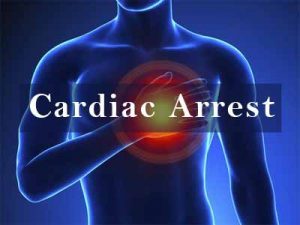- Home
- Editorial
- News
- Practice Guidelines
- Anesthesiology Guidelines
- Cancer Guidelines
- Cardiac Sciences Guidelines
- Critical Care Guidelines
- Dentistry Guidelines
- Dermatology Guidelines
- Diabetes and Endo Guidelines
- Diagnostics Guidelines
- ENT Guidelines
- Featured Practice Guidelines
- Gastroenterology Guidelines
- Geriatrics Guidelines
- Medicine Guidelines
- Nephrology Guidelines
- Neurosciences Guidelines
- Obs and Gynae Guidelines
- Ophthalmology Guidelines
- Orthopaedics Guidelines
- Paediatrics Guidelines
- Psychiatry Guidelines
- Pulmonology Guidelines
- Radiology Guidelines
- Surgery Guidelines
- Urology Guidelines
Popular drug for control of high blood pressure and angina may lead to sudden cardiac arrest

Nifedipine, one of most popular and most commonly used medicines of yesteryears for control of High blood pressure and angina has been found to cause sudden cardiac arrest.Nifedipine is one of the first from group of calcium channel blockers and is one of the most prescribed drugs of 80s.
The results of a study, European Sudden Cardiac Arrest network (ESCAPE-NET) presented at the annual congress of European Heart Rhythm Association 2019 in Lisbon, showed that high-dose (60 mg/day) nifedipine was significantly associated with an increased risk of out-of-hospital cardiac arrest.
Sudden cardiac arrest is the abrupt loss of heart function, breathing and consciousness which usually results from an electrical disturbance in heart that disrupts its pumping action, stopping blood flow to body.It is estimated to cause around half of cardiac deaths in Europe and one in five natural deaths.
In sudden cardiac arrest, heart stops pumping after a cardiac arrhythmia (ventricular fibrillation/tachycardia); this is lethal in minutes if untreated. ESCAPE-NET was set up to find the causes of these arrhythmias, so they can be prevented.
Dr Hanno Tan, ESCAPE-NET project leader and cardiologist, Academic Medical Centre, Amsterdam, the Netherlands, urged caution when interpreting these results. He said: "The findings need to be replicated in other studies before action should be taken by doctors or patients."
The study examined if nifedipine and amlodipine, dihydropyridines widely used for high blood pressure and angina, are linked with out-of-hospital cardiac arrest. The nifedipine doses most often used and studied in this investigation are 30 mg and 60 mg (90 mg is available but infrequently used) and the amlodipine doses are 5 mg and 10 mg. Standard practice is to start with a lower dose, then give the higher dose if blood pressure or chest pain are not sufficiently reduced.
The analysis was done using data from the Dutch Amsterdam Resuscitation Studies registry (ARREST, 2005-2011) and confirmed in the Danish Cardiac Arrest Registry (DANCAR, 2001-2014), both part of ESCAPE-NET. Patients with out-of-hospital cardiac arrest due to ventricular fibrillation/tachycardia were enrolled, plus up to five controls per patient matched for age and sex. Controls were from the Dutch PHARMO Database Network and the general population in Denmark. In total, the study included 2,503 patients and 10,543 controls in the ARREST analysis and 8,101 patients and 40,505 controls in the DANCAR analysis.
Current use of high-dose (?60 mg/day), but not low-dose (<60 mg/day), nifedipine was significantly associated with an increased risk of out-of-hospital cardiac arrest compared to non-use of dihydropyridines, with an odds ratio of 1.5 in ARREST and 2.0 in DANCAR. High-dose nifedipine was also associated with an increased risk of out-of-hospital cardiac arrest when compared with any dose of amlodipine, with odds ratios of 2.3 and 2.2 in the ARREST and DANCAR registries, respectively. There was no risk associated with amlodipine.
These findings may be surprising given that both drugs have been in use for many years and in many patients. A possible explanation why this discovery has only been made now is that out-of-hospital cardiac arrest is very difficult to study due to its rapid course, and requires dedicated datasets collected specifically for this purpose. Until now, there were insufficient patient records to test the impact of medications. ESCAPE-NET has made this possible by linking large cohorts across Europe, including ARREST and DANCAR.
The work of ESCAPE-NET will be discussed in two sessions at EHRA 2019, highlighting the importance of working across Europe2 and advances in preventing sudden cardiac arrest during sports.3
Dr Tan said: "As a European consortium we can validate our findings in different populations, and we bring together different expertise. For example, sudden cardiac arrest during sports is 19 times more common in men than women and the network enables us to comprehensively evaluate the potential biological (sex) and behavioural (gender) reasons.
BloodCADcalcium channel blockerscalcium-channel blockercardiac arrestcardiac arrhythmiasCCBcommonCongressCoronary artery diseaseDrugESCAPE-NETEuropean Heart Rhythm AssociationEuropean Sudden Cardiac Arrest networkhighhigh BPnifedipinepressuresudden cardiac arrestventricular fibrillationVF
Next Story
NO DATA FOUND

Disclaimer: This site is primarily intended for healthcare professionals. Any content/information on this website does not replace the advice of medical and/or health professionals and should not be construed as medical/diagnostic advice/endorsement or prescription. Use of this site is subject to our terms of use, privacy policy, advertisement policy. © 2020 Minerva Medical Treatment Pvt Ltd